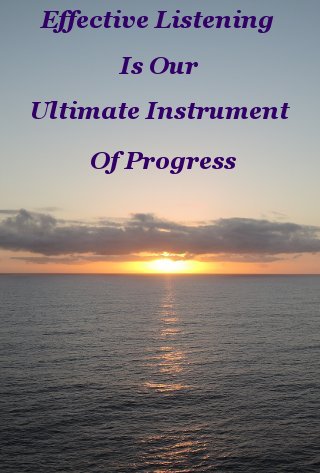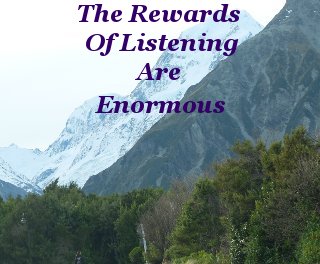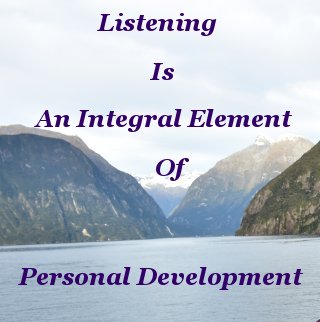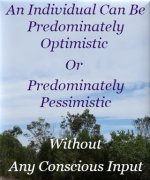Effective Listening Is A Game Changer
Effective Communicators Are People Acting With Purpose
Effective listening is fundamental to effective communication. In fact it is fifty percent of cogent dialogue. The remaining fifty percent is effective speaking. Whenever communication is not functional, we are simply indulging, at best, in time wasting.
Purpose In This Case Is Threefold:
- One – Intentionally understand the speaker
- Two – Stay focused on the subject being discussed
- Three – Achieve the purpose of the discussion
Both speaker and listener are vitally aware of the danger of losing sight of their purpose. It is the remaining true to their purpose that enables Effective Communicators to achieve all three goals.
Abiding by purpose reduces, and often eliminates, the ever present danger, verbal exchanges carry, of deteriorating into an argument.
Effective Communication
On a person to person basis effective listening invigorates, and encourages, Intelligent Speaking. In other words, Intelligent Thought.
On a one to many basis it can change the world. Via that same access to Intelligent Thought.

Dialogue is one of the major ways we Human Beings get to understand each other. Doing so takes concentration, time, patience, and much energy.
Understanding what another means, is not cast in stone. It often takes considerable interactive discussion, before that crucial aha moment is reached.
If we are to communicate effectively, the lesson we Humans must take to heart is when we stretch our mind to listen to another with the intention to understand their meaning, this understanding must be our sole focus.
When one applies self imposed filters, it merely distorts the message, alienates the speaker, and suggests we are mind readers.
Listening can be considered effective, when the speaker’s Thoughts are truly comprehended. Sometimes this is clear-cut, immediate, and long lived, irrespective of the complexity of the message being delivered. An example of this phenomenon is John F Kennedy’s Moon Speech, which is still prodigiously bearing fruit.
Effective communication can also take a lifetime of suffering and trauma before a message is comprehended. As was the case with Mohandas Gandhi. Note the difference between the two audiences.
Notwithstanding these two extremes, both men are Heroes. Both lost their life to their cause. Both speakers have left an outstanding legacy to guide you and I along the path of Effective Communication. Both men were on the side of inclusion.
The Context Dialogue Takes Place In Is All Important
While there are no hard and fast rules for effective listening, the context dialogue takes place in determines the type of listening that takes place. There are fundamentals of listening that help to facilitate communication. We learn by doing, discovering what both works for us, and we feel comfortable with.
Discussing a solution to a technical problem with a colleague, is quite different to supporting another Human who is suffering emotionally.
Soliciting any information from a Human suspected of committing a crime requires a different approach to someone relating a humorous story. Particularly considering that criminals are mentally disturbed individuals.
On an individual level effective dialogue always insists and depends on the speaker feeling he or she has been heard, and understood. A speaker and listener are sharing intimacy, in time and space.
This intimacy can be extended across time and space infinitely between a speaker, and his or her audience, of any capacity.
The World Is Changed By Effective Listening
The absolute power of effective listening can be fathomed from the life changing words of the following five influential speakers, where the speaker’s intended goals were manifested in such dramatic fashion, that it is difficult to mount an argument against it.
If any of the following speakers were not listened to, and their Thoughts not acted upon, we Humans would now be living in a different World. A few minutes reflection on this statement, allowing your imagination free rein, will reveal the extent of that difference.
- Adolph Hitler – A Monster possessing inexplicable charisma who led a Nation down the path of abomination and threatened the World with tyranny.
- Winston Churchill – A determined man who led his people from the depths of despair in the face of a vicious enemy, to a gallant fighting machine that with the help of like minded Nations delivered the World from The Menace Of Tyranny. Churchill’s readily adoptable mantra, Never, Never, Never Give Up, should be at the forefront of our mind.
- Mohandas Gandhi - A very special man whose words saved his Nation from the domination of foreigners, but could not save his compatriots from themselves. A brief account of his story is related on this Non Cooperation page.
- Nelson Mandela – A Statesman cast in the mold of Mohandas Gandhi. Mandela also rescued his people from tyranny.
- John F. Kennedy - We Choose To Go To The Moon – This simple sentence is the foundation rock of a speech that revitalized a floundering Nation and refocused it’s attention on it’s ability to delve into Nature, and in particular, Her Fundamental Forces, to discover Her secrets. Kennedy's speech can be found here . . .
John F. Kennedy Moon Speech - Rice Stadium

The liberal rewards this focus has delivered, and yet still delivering, more than half a century later, are extensive, and promise to be endless.
A single word is responsible for the steady stream of Good technical achievement, and the prosperity that achievement brings, and secures Humanities future.
That single word is Choose. We Choose To Go To The Moon. We deliberately choose Good. We deliberately choose progress. Deliberately Choose equality.
This one word is the foundation rock of Personal Development. All aspects of Mind Expansion must be a deliberate individual choice.
Influence Of Radio And Movies
The power of effective listening is evident in Good and evil as depicted above. It is also evident in fact and fiction. On the fictional front you may recall the mayhem caused by Orson Wells – author of the radio production, War Of The Worlds. Listeners to this program believed that the Earth was under attack by Beings from Outer Space, and panicked accordingly.
During the 1950s, the movie, The Wild Ones, featuring Marlin Brando and his companions on motorcycles, sent shock waves around the World, inducing people to believe they were about to be terrorized by a gang of bike riding thugs. This belief persisted despite there being no immediate evidence to support it.
The Wild Ones – a subdued movie story-line by today's standards - and the imaginary terror it aroused, spawned the reality of gangs of bike riding thugs. Positioning a cloud of suspicion over, and fear of, every legitimate motorcyclist on the road, including this author. Who knows what economic damage this irrational viewpoint did to the world wide motorcycle industry.
Fact To The Rescue
The emerging Japanese motorcycle company, Honda, came somewhat to the rescue in the early 1960s with their refreshing and welcome advertising jingle, 'The Nicest People Ride A Honda'. Motorcycle sport, and the proliferation of genuine motorcycle clubs, also played a significant role in alleviating the serious misconception created by a simple movie.
Honda’s innovative campaign moderately reduced the dread evoked by the sound of a loud motorcycle exhaust. Albeit, it was not until fairly recent times, perhaps coinciding with the passing on of the generation influenced by The Wild Ones, that motorcycles have regained a deserved aura of acceptability.
Effective Listening Is A Powerful Tool Indeed
The resulting behavior we engage in generated by the words of a speaker should be of our own choosing.
Once a listener, or listeners, and the speaker, are satisfied that unbiased comprehension has been reached, then those involved can decide what action is appropriate to choose.
The Choices Are All Ours:
- We can choose to listen effectively
- We can choose to understand without bias
- We can choose to learn
- We can choose to act responsibly and for the Common Good

Effective communication is inextricably affiliated to the power of words, and takes place in an environment of cooperation and empathy.
Whether the consequences are Good or evil, depends entirely on the composite decisions of we individuals.
From the contents of this page alone, we can see that effective listening, inextricably allied to Thought, can change the World.
Comprehension of any and every situation is entirely the responsibility of the listener. So true is it - no one can listen for another.
Let's not forget we are in charge of our Thoughts when we decide to purposely understand a speaker.
Effective Listening Rocks!
Next - Is Incubating





